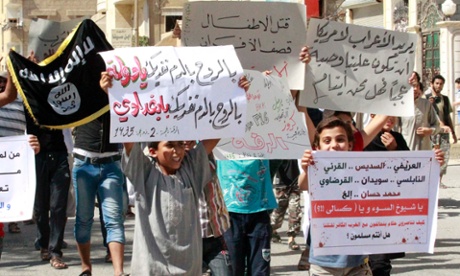
Since Islamic State (Isis) were formed in their current incarnation
in April last year, they have had a dilemma: how to gain legitimacy from
the local population while continuing to be ruthless and genocidal
against fellow Sunnis. The decision by the American-led coalition to
strike against Isis while overlooking the Assad regime seems to have
resolved this dilemma for the jihadist organisation. What Isis will lose
in terms of strength and numbers as a result of the air strikes they
might gain in terms of legitimacy.
Air strikes against Isis were inevitable, as the group’s advances
towards Baghdad, Erbil and northern Syria seemed irreversible by local
forces. But the way the US-led coalition, which the UK has now joined,
has conducted itself so far threatens to worsen the situation in favour
of Isis.
Most importantly, by overlooking the regime of Bashar al-Assad, which
caused the death of nearly 200,000 Syrians, the air strikes create the
perception that the international coalition is providing a lifeline to
the regime. Despite repeated reassurance by Washington, such a
perception is likely to become entrenched if the Assad regime begins to
fill the vacuum left by the offensive against Isis, especially that
there has been no evidence yet that the opposition forces are part of
the military strategy against Isis.
The regime might deliberately step up its campaign in some areas to
retake areas it has recently lost to the jihadist group to reinforce
that perception, as Syrian officials were quick to issue statements that
the regime had been briefed about the air raids before they were
launched.Many Syrian rebel factions, including ones directly financed by
the Americans and the Gulf states, expressed reservations about, or
opposition to, the air strikes, including Harakat Hazm, Division 13,
Suqour al-Sham. The significance of such statements is that they are
issued by groups currently operating in areas outside Isis control but
which are adjacent to Isis front lines. That makes them more capable
than other groups of being part of potential ground forces to attack
Isis under air cover. Even though some of these groups made such
pronouncements mostly for practical reasons, since they are the ones who
will bear the consequences of any failure to dislodge Isis as they
fight on the ground, they are also concerned that the international
campaign will aid the Assad regime.
Regionally, the offensive against Isis has received a similar cynical
reaction from groups and people in the Middle East. The Muslim
Brotherhood, including prominent figures such as Doha-based Yusuf
al-Qaradawi, condemned the attacks inside Syria. Arab countries that
have participated in the international military campaign including Saudi
Arabia, the United Arab Emirates and Jordan, have been particularly
criticised for failing to push for a formula that undermines Isis and
Assad at the same time. In comparison, Iran opposed the air strikes
against Isis in Syria while Turkey made it clear that the offensive
would fail without moves to undermine the Assad regime, including a
no-fly zone.
These attitudes mean that Isis are set to gain from the international
campaign against them, if the current strategy does not change. Based
on conversations with people from eastern Syria, including Isis members
and sympathisers, the offensive against Isis seems to have already
achieved one thing for the jihadi group: to push some Isis members who
were on the periphery into their core, and neutralise some of their
Islamist opponents. Many of Isis members are new to the group and they
are still ideologically uncertain. But since Isis are now face to face
with a numerically exaggerated alliance led by Washington, Isis members
who could otherwise shift away from the group have become more
determined adherents.
Isis can afford to lose their supply lines, infrastructure and many
of their members – who are likely to be among the ones who recently
joined it – as long as they can compensate by achieving popular
recognition. They are already adapting to the campaign, reducing
checkpoints (now mostly mobile) to a minimum and relocating weapons
warehouses to safe areas in both Iraq and Syria.
People inside Syria say most of the bases or facilities hit by air
strikes had been already emptied. While the air raids will surely
undermine Isis’s ability to generate revenue by disrupting supply lines
from factories or oilfields, Isis can survive without such easy-money
resources. Also, it is important to highlight that Isis have established
an intricate sleeper cell system that has not been unveiled, even when
they felt secure in their territories.
Legitimacy for the fight against Isis cannot be achieved by simply
having Sunni countries involved in it, but, rather, by addressing the
true reasons that drove tens of thousands of Syrians to rise up against
the regime.
Regardless of who is involved in the campaign, the perception is that
the allies have overlooked the acts of the Assad regime over the past
three years and quickly assembled a major international coalition
against a group that the Syrian rebels have been fighting since last
summer. Unless the strategy against Isis shifts to a broader one that
appeals to the local communities, the fight against it is doomed.
Hassan Hassan is an analyst with the Delma Institute, a research house in Abu Dhabi. @hxhassan